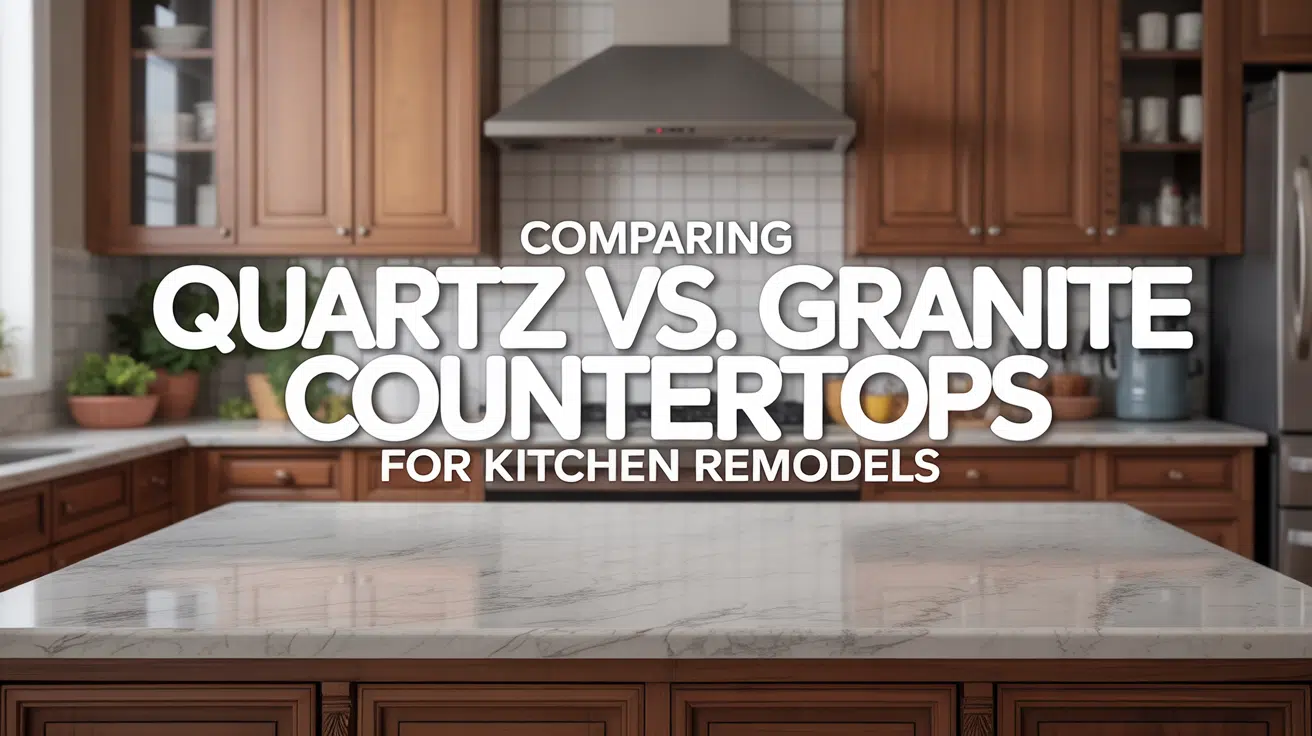
No Comment
Comparing Quartz vs. Granite Countertops for Kitchen Remodels
Introduction
Choosing the right countertop is one of the most important decisions in a kitchen remodel. After all, countertops are not only functional but also set the tone for your kitchen’s overall aesthetic. With so many options available, quartz and granite stand out as two of the most popular choices. Both materials offer unique benefits, but understanding their differences can help you make an informed decision that aligns with your lifestyle and design goals 😊.
Whether you’re drawn to the timeless elegance of granite or the sleek modernity of quartz, each material has its own strengths and considerations. Let’s dive into the details to help you decide which option might be the perfect fit for your home!
Material Composition and Manufacturing
Granite is a 100% natural stone, quarried directly from the earth and cut into slabs. Its formation deep within the Earth’s crust gives it incredible strength and durability. Each slab is unique, showcasing the beauty of nature through intricate patterns and colors. This makes granite a favorite among homeowners who love organic textures and one-of-a-kind designs.
On the other hand, quartz is an engineered stone made by combining crushed quartz crystals with resins and pigments. This process results in a product that’s consistent in appearance and highly customizable. While it may lack the “natural” label, quartz offers unparalleled design flexibility, making it a top contender for modern kitchens. Plus, its uniformity ensures fewer surprises during installation 💡.
Appearance and Design Options
One of granite’s standout features is its natural variation-no two slabs look exactly alike. These unique patterns give your kitchen a distinct personality, whether you prefer earthy tones or bold, gem-like shades. If you’re someone who values individuality in design, granite might be the way to go.
Quartz, however, shines when it comes to consistency and variety. Because it’s manufactured, quartz can mimic the look of marble, granite, or even solid colors without any of the maintenance headaches. Whether you want a minimalist white surface or a dramatic veined pattern, quartz delivers endless possibilities for creating your dream kitchen 🎨.
Durability and Longevity
Both quartz and granite are incredibly durable, standing up well against scratches, chips, and daily wear. Granite’s natural density makes it exceptionally tough, while quartz’s resin blend adds extra resilience. However, granite takes the crown when it comes to heat resistance-you can place hot pots and pans directly on its surface without worry.
“Quartz countertops are synthetic stone products made of quartz chips or dust mixed with resins. Most of the material is composed of minerals but up to 15 percent can be resins and color pigments. Quartz countertops are not slabs of quarried stone.”-The Spruce
That said, quartz isn’t far behind in practicality. While it’s slightly less heat-resistant due to its resin content, it excels in stain and scratch resistance thanks to its non-porous surface. For busy families or avid cooks, both materials are excellent choices that will last for years to come 🔥.
Maintenance and Cleaning
When it comes to upkeep, quartz has a clear advantage. Its non-porous surface means it doesn’t absorb spills, stains, or bacteria, making cleaning as simple as wiping it down with soap and water. This low-maintenance quality is a huge selling point for homeowners with hectic schedules.
Granite, being porous, requires regular sealing to maintain its stain resistance. Without proper care, liquids like wine or oil can seep into the stone and leave permanent marks. But don’t let this deter you-if sealed correctly, granite remains a stunning and long-lasting option. Just think of it as giving your countertop a little TLC every now and then ❤️.
Cost: Price per Square Foot and Installation Factors
The cost of quartz and granite countertops can vary widely depending on factors like color, finish, and availability. On average, both materials range from $50 to $100 per square foot installed. However, rare granite colors or exotic patterns can push the price higher, while quartz tends to stay more consistent due to its engineered nature.
“The beauty of the stone is preserved in the cutting and polishing process, making each countertop one-of-a-kind, with colors ranging from earthy tones to vibrant gem-like shades.” -Real Simple
Installation costs also play a significant role in the final price tag. Both materials are heavy and require professional handling, so budget accordingly. To get the best value, consider consulting experts at VK Renovations, who specialize in helping homeowners compare these premium surfaces for their kitchen remodels 💸.
Heat, Stain, and Scratch Resistance
Granite’s ability to withstand high temperatures makes it ideal for cooking enthusiasts. You can confidently place hot dishes straight from the oven onto its surface without fear of damage. This heat tolerance is one of granite’s biggest perks, especially in kitchens where functionality is key.

For families juggling multiple tasks in the kitchen, quartz’s stain resistance provides peace of mind. Accidental spills won’t ruin your countertop, and cleanup is a breeze. Meanwhile, granite’s timeless appeal and heat tolerance make it a classic choice for those who prioritize performance over perfection 🏡.
“Both quartz and granite are extremely durable against scratches, heat, staining, and daily wear and tear.”-Real Simple
Environmental Impact
When it comes to environmental impact, both materials have pros and cons. Granite requires extensive quarrying, which can disrupt ecosystems and consume energy. However, once installed, it’s a long-lasting solution that minimizes waste over time.
Quartz’s manufacturing process involves binding resins and pigments, which raises questions about sustainability. That said, advancements in eco-friendly production methods are making quartz a greener choice than ever before. Homeowners should weigh these factors based on their personal values and priorities 🌱.
Resale Value and Popularity Trends
Historically, granite has been prized for its luxurious appearance and ability to boost resale value. Its reputation as a premium material makes it a safe investment for homeowners looking to enhance their property’s market appeal.
However, quartz is quickly gaining ground, particularly among younger buyers who appreciate its low-maintenance qualities and contemporary style. As trends shift toward convenience and sustainability, quartz is becoming a strong competitor in the real estate market. It’s worth considering what appeals most to potential buyers in your area 🏠.
“Quartz stands out as the more practical and low-maintenance option for modern homeowners. Its non-porous surface, stain resistance, and vast array of design possibilities make it an excellent choice for a beautiful, hygienic, and worry-free kitchen.”-Granite Selection
Color and Style Variety
Quartz truly shines when it comes to color and style options. Thanks to its engineered composition, manufacturers can create virtually any hue or pattern imaginable. From crisp whites to rich charcoals, quartz caters to every taste and trend.
Granite, though limited by nature’s palette, offers unmatched authenticity. Its natural veining and speckling add depth and character that no man-made material can replicate. If you’re torn between the two, ask yourself whether you value versatility or uniqueness more in your kitchen design 🌈.
Installation Considerations
Both quartz and granite are heavy materials that demand professional installation. They’re not DIY-friendly, and improper handling can lead to cracks or uneven surfaces. Before installation, ensure your cabinetry and support structures are sturdy enough to bear the weight. Consulting with experienced professionals, like those at VK Renovations, can save you time and stress during the process 💪.
Common Myths and Misconceptions
A common misconception is that quartz is entirely “natural stone.” While it contains natural quartz crystals, the addition of resins and pigments makes it an engineered product. Understanding this distinction helps clarify why quartz behaves differently from granite in certain scenarios.
“When designing a kitchen, one of the most important … granite is a clear winner it’s a natural stone so you’re going to be able to put a hot pan or a plate right on top of it … whereas quartz is made of resin as well so you’re going to burn the resin the minute that you put a hot plate or pot on top.”-YouTube
Another myth is that granite is always more expensive. While some rare varieties can carry a hefty price tag, many granite options fall within the same range as quartz. Don’t let assumptions guide your decision-explore both materials to find what works best for your budget and needs ✨.
Choosing the Right Material for Your Kitchen
Selecting between quartz and granite ultimately boils down to your priorities. Are you someone who loves the idea of a low-maintenance, modern surface? Or do you crave the natural charm and heat resistance of granite? Consider your lifestyle, kitchen habits, and design preferences carefully.
For example, if you entertain often or have young children, quartz’s stain resistance might be a lifesaver. But if you’re a culinary enthusiast who values tradition and performance, granite could be your perfect match. Take the time to explore samples and consult experts to make the best choice for your home 🏡.
Frequently Asked Questions
- What are the main differences between quartz and granite countertops?
- Quartz is an engineered stone made from natural quartz crystals mixed with resins, offering consistency and low maintenance. Granite is a natural stone with unique patterns and superior heat resistance.
- Which countertop material is more durable?
- Both are highly durable, but granite edges out quartz in heat resistance, while quartz wins in stain and scratch resistance.
- Do quartz or granite countertops require sealing?
- Granite requires regular sealing to prevent stains, while quartz does not need sealing thanks to its non-porous surface.
- Are quartz countertops more expensive than granite?
- Prices are comparable, though rare granite colors can exceed quartz costs. Installation and labor fees also influence the total expense.
- Which is better for families with young children?
- Quartz is often preferred for its stain resistance and easy cleaning, making it ideal for busy households.
Conclusion
In the debate of quartz vs. granite countertops, there’s no definitive winner-it all comes down to what matters most to you. Granite offers timeless beauty and heat resistance, while quartz provides modern convenience and design flexibility. Both materials are durable, stylish, and capable of transforming your kitchen into a space you’ll love.
Before making a decision, evaluate your priorities in terms of maintenance, appearance, and budget. Request samples, visit showrooms, or consult professionals like VK Renovations to explore your options. Remember, the best choice is the one that fits your lifestyle and enhances your home’s unique character. Happy remodeling! 🎉



 “When designing a kitchen, one of the most important … granite is a clear winner it’s a natural stone so you’re going to be able to put a hot pan or a plate right on top of it … whereas quartz is made of resin as well so you’re going to burn the resin the minute that you put a hot plate or pot on top.”
“When designing a kitchen, one of the most important … granite is a clear winner it’s a natural stone so you’re going to be able to put a hot pan or a plate right on top of it … whereas quartz is made of resin as well so you’re going to burn the resin the minute that you put a hot plate or pot on top.”